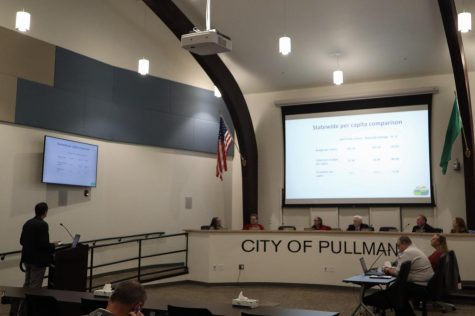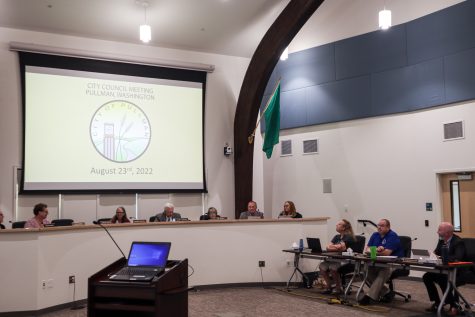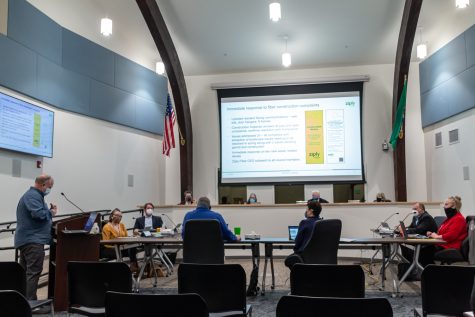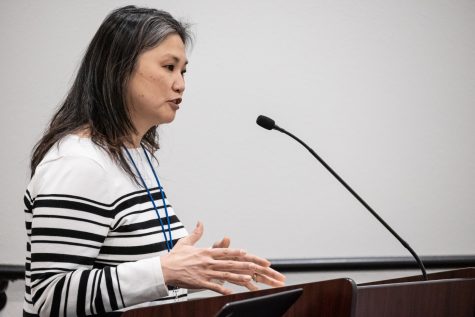League of Women Voters hosts virtual issue forum about ballot measures
Senate Bill 5395 will require all state public schools to teach comprehensive sex education; Senate Joint Resolution 8212 will allow government to invest in stock market
LWV President Bobbie Ryder said Senate Bill 5395 and Senate Joint Resolution 8212 will appear on this year’s ballot.
October 13, 2020
The League of Women Voters of Pullman and the Pullman Chamber of Commerce discussed a bill that would require schools to teach comprehensive sex education to all students, as well as a resolution that would allow the government to invest in the stock market, during a virtual issue forum Monday night.
Senate Bill 5395, also known as the Comprehensive Sex Education bill, and Senate Joint Resolution 8212 will appear on this year’s ballot. The league provides nonpartisan election information on candidates and issues, said LWV President Bobbie Ryder.
The bill would require comprehensive sexual health education for all students, Ryder said. Parents can request their children be excused if necessary.
Too many students are not receiving high-quality sexual health education, which puts them at risk for harm, said Kat Odell, LWV member, while reading a statement in favor of the bill.
Approving Referendum 90 will require all public schools to teach age-appropriate inclusive sex education, Odell said.
It will start with social and emotional learning for students, she said. This includes teaching older students ways to prevent unwanted pregnancies and practicing affirmative consent.
Studies show students who receive high-quality sexual health education are less likely to partake in risky sexual behaviors, experience unintended pregnancy or get sexually transmitted infections, Odell said. The comprehensive sex education approach will also help teach personal boundaries and consent.
Huge numbers of students are failing math, science and English, said Mary Collins, LWV member, while reading a statement opposing the bill. There needs to be a greater focus on improving those skills rather than creating a new mandate.
Referendum 90 should be rejected, she said.
Approving the bill would mean “unelected, unaccountable bureaucrats” would be developing state-wide sex education standards for all students instead of local communities, she said.
Ryder said the LWV encourages every Washington voter to review the voter’s guide.
Senate Joint Resolution 8212 is a constitutional amendment on investment of public funds, Ryder said. The resolution would allow public money held in a fund for long-term care services to be invested by governments in private stocks. But state and local governments are limited to investing public funds in fixed income securities, like government and corporate bonds.
In 2019, the legislature enacted a law providing long-term care insurance, which requires employees to pay premiums for state-sponsored long-term care benefits. This will be paid through a payroll deduction that will begin Jan. 1, 2022, she said. The premiums will be deposited into a new account where the funds cannot be invested into stocks.
People have not realized the cost of long-term care and have not adequately saved, said Cathleen MacCaul, AARP advocacy director.
There will be a large number of people over the age of 65 in the state who will require a long-term care system, she said.
There are 1.2 million seniors in the state, and that number will continue to grow, she said. The resolution gives the state investment board the ability to invest funds and have options in how to invest those funds.
The goal is to provide people with a substantive long-term care benefit, MacCaul said. If the bill is rejected, then people will be losing $5 billion over 20 years. The benefit will be reduced and the premium will go up.
She said there will be an independent commission that will review the investment model and the proportions of investments, which will benefit hundreds of thousands of people who are low-income people or have not saved a lot of money for retirement.
Sen. Bob Hasegawa, D- Seattle, said he does not oppose the establishment of the law or the services it provides because he voted for the underlying bill. But he opposes investing the money into the stock market because it will put the trust fund at risk.
It is not quite accurate to say the people will lose $5 billion over the next 20 years, he said.
After the recession, the state investment board lost about 33 percent of its value, Hasegawa said. There is a guaranteed return in investing in municipal bonds because the money will not be lost or put at risk.
The value might be increased or decreased rapidly in stock markets, he said. It would be fiscally irresponsible to invest in the stock market.


















